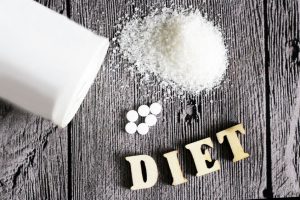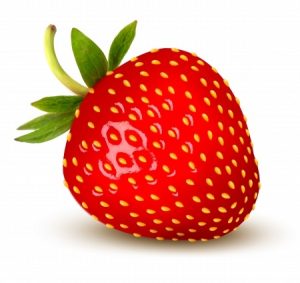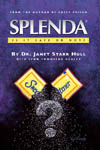
Are you gaining weight while using the diet sweeteners?
Do you want to know WHY?
Chemical sweeteners have been proven in laboratory studies to cause weight gain.
How?
Well, artificial sweeteners create unstable blood sugar levels, which in turn increases appetite and causes cravings for sweets and sugar.
This can be very harmful to those with diabetes or epilepsy. This can cause fluid retention, giving the body a puffy and bloated appearance, which in turn increases cellulite.
Aspartame

Aspartame stimulates your appetite because over half of its content is in the form of a phenylalanine isolate.
Appetite Stimulation
When ingested, the amino acid phenylalanine out-competes all the other enzyme sites in the body.
This suppresses the formation of dopamine from tyrosine and the formation of serotonin from tryptophan. And this affects your serotonin levels.
Serotonin
Why is serotonin so important?
Serotonin is the neurotransmitter that “reports” carbohydrate metabolism.
When serotonin levels are not allowed to rise as they normally do when you eat carbohydrates, you crave more and more food.
You stay hungry all of the time. You eat more. You binge on simple carbs. You gain weight, and you use MORE artificial sweeteners.
Dopamine is the neurotransmitter that lets you feel satisfied, so when you use aspartame regularly, you have insatiable cravings.
Artificial sweeteners, like aspartame, alter the body’s metabolism, and you cannot burn calories in a normal manner.

Methyl Alcohol Poisoning
One of the major components of the aspartame molecule is methyl alcohol. Methyl alcohol has long been recognized in medicine for its ability to block normal metabolism.
For this primary reason, when doctors see a patient who has been poisoned by methyl alcohol or methyl esters, they can accurately predict the patient will develop a severe acidosis because food cannot be metabolized normally.
The breakdown products of the methyl alcohol, in addition to the acids developed from this blocked metabolism, gravely endanger your health.
Aspartame is a highly aggravated form of methyl alcohol poisoning.
Neuro-excitotoxins, such as aspartame and MSG, stimulate appetite in your brain. This may or may not change the taste of food, but the food may taste better because your appetite has been stimulated.
Dr. F. Batmanghelidj, M.D. writes in an excerpt from his book Your Body’s Many Cries for Water, GHS, Inc.:
Many persons confuse their feeling of thirst as hunger. Thinking they have consumed enough “water” that is in a soda, they assume they are hungry and begin to eat more than their body’s need for food. Thus, dehydration, in due time, will cause a gradual gain in weight from overeating as a direct result of the confusion of thirst and hunger sensations.”
Cephalic Phase Response

A reflex occurs when your brain reacts to a “sweet taste” referred to as a “cephalic phase response.”
When a sweet taste stimulates your tongue, the brain programs your liver to prepare for acceptance of new energy in the form of sugar from ‘the outside coming in.’
If it is indeed sugar that stimulates the response, the effects on your liver will be the proper regulation of that sugar which has entered the body.
However, if the sweet taste is NOT followed by a real nutrient, an urge to eat will be the outcome.
According to Dr. Batmanghelidj, it is the liver that produces the signals and the urge to eat. The more sweet taste that stimulates your taste buds without the accompanying calories, the more there is an urge to eat – over eat.
I refer to these artificial sweeteners as “prosthetic foods” because a prosthesis looks like the real thing, such as a false tooth, an arm or a leg, but there is nothing inside of it.
So it is with ALL fake foods. They may look like real food, but there is nothing inside the molecules for the body to eat.
The effect of the cephalic phase response has been clearly shown in animal studies with the use of saccharin.
Even though saccharin isn’t toxic, like aspartame, sucralose or acesulfame-K, just like aspartame, scientists have shown an urge to overeat in humans when ANY and ALL chemical sugars are used.
Blundel and Hill documented that non-nutritive sweeteners, such as aspartame and saccharin, in solution enhance appetite and increase short-term food intake.
They reported:
After ingestion of aspartame, the volunteers were left with a residual hunger compared with what they reported after glucose (sugar). This residual hunger is functional, and it leads to increased food consumption.”
Another group of researchers, Tardoff and Friedman, have shown that this urge to eat more food after ingesting artificial sweeteners can last up to ninety minutes.
They documented that when blood levels for insulin production are normal (FYI – a high reading of insulin is believed to be a cause of hunger), test animals consumed more food than the control batch.
This proves that the “brain” retains the urge to eat when the taste buds are stimulated without “real” sugar (glucose) having actually entered the body.

Thirst Creates Hunger
Dr. Batmanghelidj believes that the use of artificial sweeteners for “false stimulation” of nerve terminals that register the entry of energy into the body, have more severe repercussions than simply causing an increase in weight.
These chemicals constantly swing the body in the direction dictated by the nerve system that they stimulate. Just because they pleasantly stimulate the taste buds, their use is shortsighted.
Batmanghelidj writes,
My understanding of the micro-physiology within cells causes me concern when I think of the routine use of these artificial sweeteners. I worry about the outcome of the long-term effects of the direct stimulation of the nerve/glandular systems in the brain with these chemical sweeteners.
It is primitive and simplistic thinking that one could easily lace water with all sorts of pleasure-enhancing chemicals and substitute these fluids for the natural and clean water that the human body needs.
Some of these chemicals – caffeine, aspartame, saccharin and alcohol – through their constant lopsided effect on the brain, uni-directionally –single mindedly — program the body chemistry with results contrary to the natural design of the body.”
To read more about the research, visit the links for my books Sweet Poison and Splenda®: Is It Safe Or Not?


_____________________
If you want to learn all about the artificial sweeteners, contact me at janethull.com. Remember that you are never alone when you are looking for good health!
Gain access to all of my online programs, ongoing support, monthly Q&A, and more by joining my Private Inner Circle Membership Program. I look forward to supporting you on your journey to alternative health and wellness.
_____________
Disclaimer: This article is for informational purposes only, and is educational in nature. The FDA may not have evaluated some of the statements. This article is not intended to diagnose, treat, cure, or prevent any disease. Please discuss with your own, qualified health care provider before adding supplements or making any changes to your dietary program.
Before taking vitamins, consult your doctor; pre-existing medical conditions or medications you are taking can affect how your body responds to multivitamins.
You have our permission to reprint this article if you attribute us with a live back-link to this article and the youtube links. https://janethull.com/